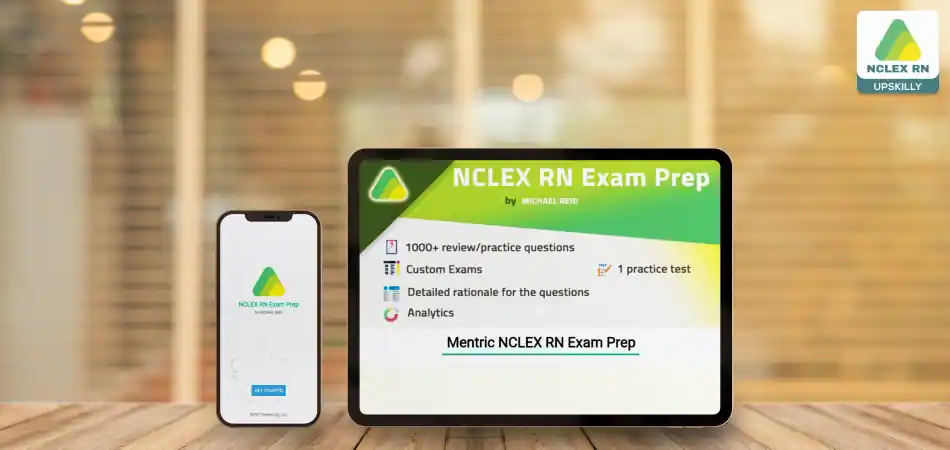NCLEX-RN
- Home
- All Courses
- NURSING
- NCLEX-RN
Overview
The NCLEX RN Test Prep & Exam
“The best way to predict your future is to create it.” – Abraham Lincoln
The best way to ensure your success on the NCLEX RN exam is to prepare for it diligently
NCLEX RN exam is a comprehensive and challenging test, but with proper preparation and a positive mindset, you can create a successful future as a registered nurse.
What is NCLEX RN Exam?
The NCLEX RN exam is a Computer Adaptive Test (CAT) designed to determine if an individual has the knowledge and skills necessary to practice as a registered nurse in the United States. The exam also determines if it is safe to begin practicing as an entry-level nurse. Unlike other nursing school exams, it focuses on applications, analysis, and judgments from concepts learned.
The next-gen NCLEX Rn exam has some key differences:
- Use more interactive question formats, such as drag-and-drop and hot spot items.
- Assess a candidate’s ability to make clinical judgments and apply critical thinking skills to real-world nursing situations.
- Use adaptive testing technology, which adjusts the difficulty level of the exam based on a candidate’s performance on previous questions.
- Incorporate more technology into the exam, such as electronic health records (EHRs) and other digital tools.
NCLEX RN Test Plan
The NCLEX RN exam covers a wide range of topics
- Health Promotion and Maintenance
- Pharmacological and Parenteral Therapies
- Reduction of Risk Potential
- Physiological Adaptation
- Basic Care and Comfort
- Psychosocial Integrity
- Safety and Infection Control
- Nursing Process
- Patient Education
- Nursing Research
The exact content and emphasis of the NCLEX RN exam can vary depending on the individual exam-taker and their performance on previous questions. The exam is designed to adapt to the test-taker’s level of knowledge and skill, so the specific topics and questions on the exam may differ from person to person. However, these key topics represent some core nursing practice areas that will likely be covered on the exam.
Check out our blog: How to prepare for the NCLEX exam?
Test Format
The exam is a computerized adaptive test (CAT) that adjusts the difficulty of questions based on the test-taker’s performance. However, below is the general overview:
- Consist of a minimum of 75 and 265 questions, although most test-takers will receive around 125.
- The questions are primarily multiple-choice but may include alternate format questions such as select-all-that-apply, fill-in-the-blank, and ordered response.
- The questions are divided into four categories: Safe and Effective Care Environment, Health Promotion and Maintenance, Psychosocial Integrity, and Physiological Integrity.
- The test-taker has up to 6 hours to complete the exam, although the time may be shorter depending on the number of questions received.
- The test-taker can take breaks during the exam, but the clock continues to run.
- The passing standard for the NCLEX RN exam is determined by the National Council of State Boards of Nursing (NCSBN) and may vary depending on the jurisdiction where the test is taken.
Scoring
Unlike other nursing school exams graded on a curve or based on a specific grading rubric. The NCLEX RN exam is scored on a pass/fail basis, and the passing standard is determined by the National Council of State Boards of Nursing (NCSBN). Once the test is complete, the test-taker will receive either a pass or fail result immediately.
The passing result indicates that the test-taker has met the minimum level of competency required to become a licensed registered nurse in their jurisdiction. If the test-taker does not pass the exam, they will receive a detailed performance report, including information on areas where they performed well and areas where they need to improve. The test-taker may then retake the exam after a certain period has elapsed, depending on the jurisdiction where the exam was taken.
Exam Statistics
- During the first quarter of 2022, NCLEX-RN candidates increased from 58,148 to 63,836 compared to 2021.
- The overall number of U.S.-educated NCLEX-RN candidates increased from 58,148 to 63,836.
- The passing percentage decreased from 77.19% to 74.39%.
- The average time to complete the exam was 4 hours and 39 minutes.
RN and PN Difference
The main differences between RNs and PNs are the level of education, the scope of practice, and responsibilities.
RNs have a higher level of education and are qualified to perform a broader range of tasks and procedures, while PNs have a more limited scope of practice and work under the supervision of RNs. RNs have more significant career advancement and specialization opportunities, such as becoming nurse practitioners, nurse anesthetists, or nurse midwives.
NCLEX RN Success
Strategies that may help you pass the NCLEX RN exam:
- Create a study plan: Create a schedule and timeline for when and how you will study. Make sure you allocate enough time to cover all the topics on the exam.
- Use practice tests: Take practice tests regularly to familiarize yourself with the format and types of questions you may encounter on the exam. Practice tests can also help you identify areas where you need to improve.
- Identify your strengths and weaknesses: Identify the topics you are strong in and need to work on. Focus more on the areas where you need improvement.
- Review content: Review content from textbooks, lecture notes, and other study materials. Use review books and study guides to reinforce your knowledge.
- Understand test-taking strategies: Understand the different types of questions and test-taking strategies, such as eliminating incorrect answers and prioritizing patient care.
- Take care of yourself: Take care of yourself by getting enough sleep, eating healthy, and exercising regularly. Avoid cramming and study burnout.
- Stay positive: Maintain a positive attitude and believe in yourself. Confidence can help you perform better on the exam.
Exam Registration
To register for the NCLEX RN exam, you must first meet the eligibility requirements set by the National Council of State Boards of Nursing (NCSBN). These requirements vary by state and may include the following:
- Completing a nursing education program: You must have completed an approved nursing program, an associate’s degree in nursing (ADN), or a bachelor’s degree in nursing (BSN).
- Obtaining a nursing license: You must have a nursing license or be eligible to receive a nursing license in the state where you plan to take the NCLEX RN exam.
Once you meet the eligibility requirements, you can register for the exam by following these steps:
- Create an account on the NCSBN website: Go to the NCSBN website and create an account.
- Apply: Submit an application to the board of nursing in the state where you plan to take the exam. You may need to provide documentation, such as transcripts and proof of licensure.
- Pay the exam fee: Pay the exam fee, which varies by state.
- Receive authorization to test (ATT): Once your application is approved, you will receive an ATT from Pearson VUE, which administers the NCLEX RN exam. The ATT will include instructions on how to schedule your exam.
- Schedule your exam: Use the instructions in the ATT to schedule your exam at a Pearson VUE test center.
It’s important to note that the registration process and eligibility requirements may vary depending on the state where you plan to take the exam. You should check with your state board of nursing for specific instructions and requirements.
Licensure Fees
Licensure fees for the NCLEX RN exam vary by state and are typically set by the state’s board of nursing. The fees cover processing your application, administering the exam, and issuing your license.
The licensure fees for the NCLEX RN exam range from around $200 to $400.
Are you getting ready to take the NCLEX RN exam?
Let our app help you prepare and feel confident on exam day!
With nclex rn practice questions, detailed explanations, and progress tracking to help you identify your strengths and weaknesses, the app can help you be one step closer to becoming a registered nurse.
For more details, reach out to us!
Our User Stories

Hazel Borromeo
![]()
I love this app! It will immediately give you the correct answer after you choose your answer and its rationale..

Amanda Graves
![]()
Get this app!!!!! It has so many test questions and so many practice tests. This will help tremendously with school and learning.
FAQ's
The NCLEX-RN (National Council Licensure Examination for Registered Nurses) is a standardized exam used to determine the readiness of entry-level registered nurses to practice safely and effectively. Successful completion of the NCLEX-RN is required to obtain licensure as a registered nurse in the United States & Canada
Completion of an approved nursing program and application for licensure are the main qualifications for the NCLEX-RN exam.
No, not anyone can take the NCLEX-RN exam. Only individuals who have completed an approved nursing program and meet the eligibility requirements set by their state's nursing regulatory board can take the exam.
The NCLEX-RN exam consists of a variable number of questions, with a minimum of 75 questions and a maximum of 265 questions. The number of questions a candidate receives is determined by the computer adaptive testing (CAT) algorithm, which tailors the exam based on the individual's performance.
No, you cannot take the NCLEX without a nursing degree. The NCLEX is specifically designed for individuals who have completed an approved nursing education program and meet the eligibility requirements set by their state's nursing regulatory board.
To prepare online for the NCLEX exam, utilize online NCLEX review courses and resources like Gentoo labs NCLEX Exam Prep App, which provide comprehensive study materials, practice questions, and simulated exams. Establish a study schedule, set specific goals, and engage in active learning by reviewing content, participating in interactive exercises, and seeking clarification from online forums or discussion boards.
To take the NCLEX-RN exam, individuals must meet the following requirements: completion of an approved nursing education program, submission of an application for licensure to the state nursing regulatory board, and receipt of an Authorization to Test (ATT) notification. Additional requirements may vary by state, so it's important to check the specific eligibility criteria set by the nursing regulatory board in your state.




